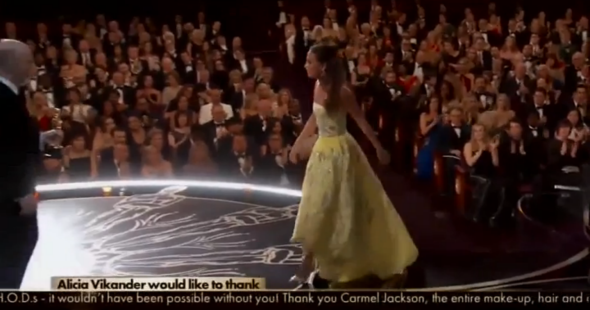This year, the Oscars made a bold attempt to fix one of its longest-standing problems. No, not the academy’s terrible record on race, though there were plenty of jokes about that. Instead, the academy tried to do away with the dullest part of the speeches, offering the nominees a chance to list everyone they wanted to thank in advance of the ceremony. The winners’ lists then ran in a ticker on the bottom of the screen as they were making their way to the stage.
The results of this well-intentioned innovation were almost uniformly bad. In theory, at least, it was designed to keep the winners from worrying about forgetting to name anyone. What’s more, it should have given them a chance to say things that really mattered, ensuring that they wouldn’t be cut off just as they were getting to the real meat of their speeches.
But the tickers did nothing other than make things far, far more awkward than they would have been otherwise. Some winners seemed to not even be fully aware that the ticker was running at all, and still spent most of their time on stage issuing statements of gratitude, apparently doing little more than repeating the names they had written out in advance.
That may have been for the best, since the tickers scrolled past so quickly that it was hard to process them while they were running. Seemingly fictional names—“Porkchop” and “Zammit”—occasionally jumped out. Slate’s Jacob Weisberg got namechecked in an acceptance speech when The Big Short won for adapted screenplay, but it was otherwise hard to catch many details. Long-winded remarks dedicated to people we generally don’t know are part of the structure and tradition of the Oscars. And this year, many of the winners were evidently unsure how to accommodate themselves to this new format.
If the point was to encourage the winners to make more memorable, socially conscious speeches, the ticker largely fumbled in that respect as well. Adam McKay, on stage to accept the award for adapted screen play, made a gesture toward the political with a remark about the importance of not voting for candidates who take money from banks. Mad Max’s costume designer Jenny Beavan rushed through a few remarks about the dangers of environmental degradation and the possibility that Mad Max’s world might become real, only to be cut off almost immediately. In both cases, their remarks felt a bit forced and out of place. If the Oscars hopes to get more political, trying to push more winners to use their acceptance speeches for political ends probably isn’t the way to do it.
It’s entirely possible that the ticker format will work better in the future. Clumsy as it was tonight, it did give the ceremony’s producers an excuse to pare down the length of speeches, and that did make the proceedings feel like they were moving a little more quickly. Once winners actually learn how to tailor their remarks around the form, it might make the whole production a little more pleasant. But tonight, the change drained some of the personality from the speeches themselves. Why not let honorees explode with joy about whatever they want, even if that means rambling ecstatically through a list of names? They just won an Oscar! It’s overzealous passion that brings the heat during the Oscars, after all.
Read all of Slate’s coverage of the 2016 Oscars.
